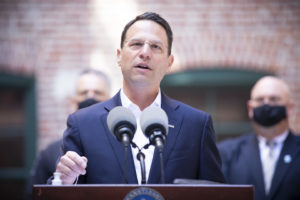Michigan governor signs 7 ed bills, OKs automatic deductions of teachers’ union dues
(The Center Square) – Gov. Gretchen Whitmer signed seven bills into law that Democrats say will boost recruiting skilled educators but Republicans say favor unions over kids’…

(The Center Square) – Gov. Gretchen Whitmer signed seven bills into law that Democrats say will boost recruiting skilled educators but Republicans say favor unions over kids’ education.
Whitmer signed Senate Bills 161-162 and 359 and House Bills 4044, 4233, 4354, 4820.
“This legislation will build on our efforts to recruit and retain the talented educators that provide Michigan students with a phenomenal education,” Whitmer said in a statement. “Earlier this year, we announced the first payments for the MI Future Educators Fellowship to hire and train teachers and we’re investing $370 million to support teachers in the recently passed bipartisan budget.”
SB 161 will allow the state to accept out-of-state teaching certifications and expands the ways educators can earn advanced teaching certificates.
SB 162 will allow the state to accept out-of-state counseling licenses under certain conditions.
State Superintendent Dr. Michael Rice said could benefits districts statewide.
“While we successfully recruit and certify more than a thousand educators a year who are initially certified outside of Michigan and subsequently in the state, these new laws will permit more rapid hiring of veteran, out-of-state educators, which will benefit districts across the state and particularly those in communities close to other states,” Rice said in a statement.
HB 4233 will allow a public school employer to deduct union dues or service fees from an employee’s paycheck.
HB 4354 will expand collective bargaining rights for public school employees to include performance evaluations, merit pay, layoff and hiring decisions, placements, discipline, and classroom observations.
HB 4820 will bring bring transparency to the factors used to fill vacancies and conduct staffing reductions at public schools.
HB 4044 will repeal the requirement that wages and benefit levels be “frozen” during contract negotiations.
House Minority Republican Leader Matt Hall, R-Richland Twp, said that Michigan Democrats handed out “favors and power to their union boss allies.”
“Democrats are dismantling accountability metrics that help parents and teachers keep kids on track,” Hall said in a statement. “They’re choosing pork over students in their wasteful budget. And now they’re giving union bosses free rein to lord over the most important decisions at our schools. Teacher placement, performance evaluations, and communication with parents are all vital to creating an effective learning environment and fostering good working relationships with families. These calls shouldn’t be made by self-serving union bosses. They should be made by administrators and elected school boards who answer to parents and the local community.”
SB 359 aims to delete compensation factors for teachers and administrators hired after Sept. 1, 2019. A community district must maintain a method of compensation that primarily considers job performance and accomplishments, including an annual evaluation.
Under the bill, a district can’t use the length of service or achievement of an advanced degree as a factor in compensation levels for teachers hired after Sept. 1, 2019. Instead, an advanced degree could be a factor for base compensation for a teacher with a secondary-level teaching certificate who has a subject area endorsement and teaches in that subject area.
The Center Square reported this change will only affect 1% of Detroit teachers.
Last week, Whitmer signed into law a record $24 billion education budget for 2024.
Michigan Education Association President-elect Chandra Madafferi welcomed the change.
“Educators across the state are excited about the changes brought forward with signing of these important bills,” Madafferi said in a statement. “The restoration of educator bargaining rights will serve to build an even stronger profession for current and future educators which, in turn, will benefit our students and communities.”



